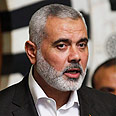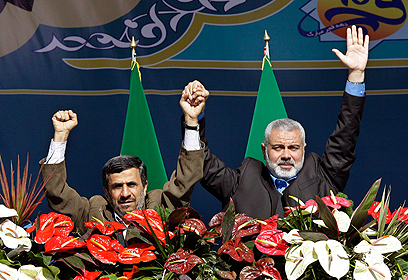
Hamas says it will not go to war for Iran
Islamist group's PM says that even if Israel strikes Tehran's nuclear facilities movement will acts only according to Palestinian people's interests
Hamas will not let itself be dragged into a war against Israel if it attacks Iran's nuclear facilities, Gaza leader Ismail Haniyeh said on Thursday.
"Hamas is a Palestinian movement that acts within the Palestinian arena and it carries out its political and field actions in a way that suits the interests of the Palestinian people," he said at his headquarters in the enclave. "Iran did not ask anything from us and we think Iran is not in need of us," he said.
Related stories:
- Hamas says it's holding talks with 5 EU countries
- 'Hamas won't honor peace treaty with Israel' Hamas warns Israel against hunger strike deaths
Israel has repeatedly said it rules out no option in its determination to prevent Iran from developing nuclear weapons. Iran says its nuclear program is for peaceful purposes.
"The Israeli threats are declared and they are not in need of analysis. But I think such an issue would have grave consequences on the entire region," the 48-year-old Hamas leader said.
"I cannot predict the scenarios but a battle of this kind would have repercussions for the region."

Ahmadinejad and Haniyeh (Photo: AP)
Israel said it would have to reckon with potential attacks from the south by Iranian-supported Hamas and from the north by the Tehran-backed Hezbollah army in Lebanon, if it came to war with Iran. Israel says both groups possess stockpiles of rockets supplied by Iran and accuses both of practicing terrorism.
Haniyeh said the grand coalition formed this week by Israeli Prime Minister Benjamin Netanyahu, which gives him an unassailable majority in parliament, had been established for internal reasons but could also have "external motives".
"On the external level there is no doubt that it was an attempt to absorb the big changes that have taken place in the region - the so-called Arab Spring - and maybe a preparation for several issues," he said.
Asked if Iran might be one of the issues, he said: "Maybe."
'Palestinian reconciliation deal not dead'
Turning his attention to the current hunger strike by hundreds of Palestinians in Israeli prisons, Haniyeh said it was "a test of Israel's commitment to universal humanitarian principles" which must be recognized. He warned that the death of any prisoner would have "negative repercussions", but did not elaborate.
"I do not wish that any prisoner in Israeli jails is martyred and so I demand that they implement international law in respect to the prisoners, who should be regarded as prisoners of war," he said.
"They are simple demands, humanitarian demands, such as ending solitary confinement, family visits, more television channels," the Hamas leader said.
Israel, he said, must keep the promises it made when captive Israeli soldier Gilad Shalit was released by Hamas last October after more than five years in confinement, in exchange for the liberation of some 900 Palestinians jailed by Israel.
The Islamic Jihad movement in Gaza, which has often exempted itself from the tacit truce agreements Hamas has made with Israel, has said it will escalate violence if a prisoner dies.
"We had a meeting with the leadership of the Islamic Jihad and they have confirmed that any negative development in the issue of prisoners would be discussed among the national front and in a meeting for factions," Haniyeh said. "They will not take a unilateral action outside of a national consensus."
As for the faltering Hamas-Fatah reconciliation deal, Haniyeh said that "it is not dead. But it's not moving,
"We have gone a long way to reach a Palestinian-Palestinian agreement but there are some external and internal obstacles."
- Receive Ynetnews updates directly to your desktop










